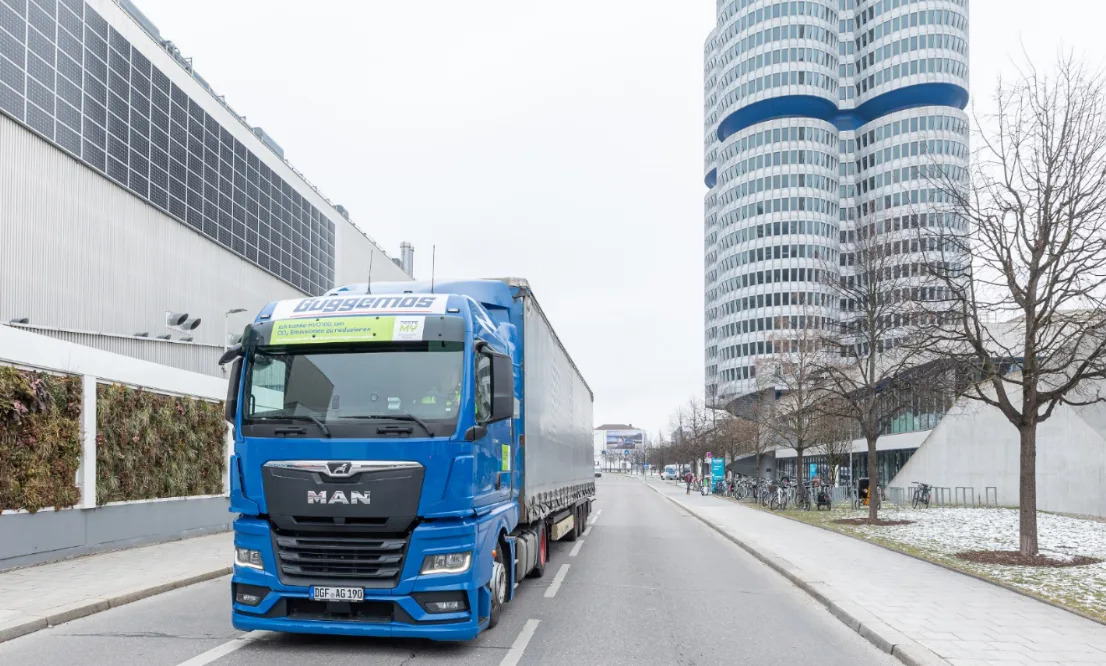
Case story
4 minute read
BMW Group piloting Neste MY Renewable Diesel as a lower-emission fuel solution
Logistics plays a key role in the value chain of vehicle manufacturing. It links all the actors participating in the logistics and vehicle manufacturing processes. Greenhouse gas (GHG) emissions are generated during manufacturing but also during the logistics of car parts as well as the brand new vehicles ready for global distribution.
BMW Group has set a target to reduce these emissions: By 2030, the company aims to reduce CO2 emissions by 40% across the entire life cycle of a vehicle. This ambitious target means that the entire life cycle of a vehicle needs to be carefully examined and potential areas for emissions savings need to be identified. Logistics is an area where such emissions and the ecological footprint can be effectively reduced when looking at the entire life cycle of the vehicles.

Pilot project with Neste MY Renewable Diesel
Technological innovations for reducing emissions in global logistics are much needed. With this in mind, the BMW Group had already kick-started multiple activities over the past years.
Since December 2022, one of the company’s initiatives in Germany has been a pilot project with Neste MY Renewable DieselTM. Four trucks belonging to the logistics service provider Guggemos (GV Trucknet) traveling 120 kilometers several times a day on the highway between Landau an der Isar and the BMW plant in Munich started using Neste’s renewable diesel. These trucks are responsible for just-in-time supplies of car parts from Landau to the main plant in Munich. In March 2023, the project was expanded to six more trucks being powered by Neste’s renewable diesel. These belong to the DB Schenker fleet and shuttle car parts from a warehouse from the BMW Group supply center in Eching to the production site in Munich, each round trip being approximately 40 kilometers.
The fuel tanks of the trucks are filled with Neste MY Renewable Diesel, produced from 100% renewable raw materials, such as used cooking oil. By fueling Neste-produced renewable diesel, the greenhouse gas emissions of the transports by these trucks can be reduced by as much as 75 to 95 percent* over the life cycle of the fuel when compared to fossil diesel.
By fueling the ten trucks currently used by the BMW Group with renewable diesel, BMW is estimated to save up to 800 tons of greenhouse gas emissions (CO2e) per year compared to the use of fossil diesel. Yet there are even more advantages: The high cetane number of Neste MY Renewable Diesel ensures an efficient and clean combustion. The fuel is well-suited for very cold weather conditions (up to -32°C). Furthermore, Neste MY Renewable Diesel does not contain sulfur, oxygen and aromatic compounds and can be stored over long periods of time without deterioration in quality or water accumulation.
Reducing the carbon footprint of BMW’s logistics
Neste MY Renewable Diesel production is based on the NEXBTL™ technology patented by Neste, which allows turning a wide variety of renewable raw materials into renewable products. The portfolio of Neste’s renewable raw materials globally includes a number of waste and residue oils and fats, as well as sustainably-sourced vegetable oils. Waste and residues account for over 90 percent of Neste’s renewable raw material inputs globally.
“We are very happy that the BMW Group selected us as partner for the current pilot project with renewable diesel,” says Peter Zonneveld, Vice President Sales Europe and APAC from Neste’s Renewable Road Transportation business unit. “The use of Neste MY Renewable Diesel can make a valuable contribution to reducing the greenhouse gas emissions in the delivery and transport chains of vehicles produced by BMW.”
For the BMW Group, the use of Neste MY Renewable Diesel is quite straightforward: The fuel has a similar chemical composition to fossil diesel and is fully compatible with all diesel engines. Its use does not require any changes in the diesel-powered vehicles or their engines or in the existing fuel distribution infrastructure. The trucks used by BMW are fueled at filling stations belonging to the logistics service provider.
All solutions are needed in reducing the greenhouse gas emissions in transportation and logistics. Renewable fuel, like Neste MY Renewable Diesel is a solution available today.
*) The GHG emission reduction varies depending on the region-specific legislation that provides the methodology for the calculations (e.g. EU RED II 2018/2001/EU for Europe and US California LCFS for the US), and the raw material mix used to manufacture the product for each market.
Credits: Neste